

College Presidents Are Bullish on Online Education but Face a Skeptical Public - Technology. By Jeffrey R.
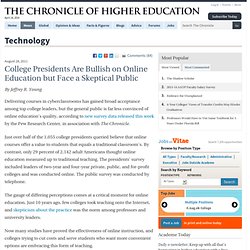
Young Delivering courses in cyberclassrooms has gained broad acceptance among top college leaders, but the general public is far less convinced of online education's quality, according to new survey data released this week by the Pew Research Center, in association with The Chronicle. Just over half of the 1,055 college presidents queried believe that online courses offer a value to students that equals a traditional classroom's. By contrast, only 29 percent of 2,142 adult Americans thought online education measured up to traditional teaching. Early Finding of Cal State U. E-Textbook Study: Terms Matter - Wired Campus. California State University is running one of the nation’s largest pilot studies of e-textbooks, involving thousands of students on five campuses, and one of the biggest findings so far boils down to the cliché the devil is in the details.
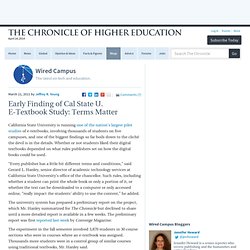
Whether or not students liked their digital textbooks depended on what rules publishers set on how the digital books could be used. “Every publisher has a little bit different terms and conditions,” said Gerard L. Hanley, senior director of academic technology services at California State University’s office of the chancellor. Such rules, including whether a student can print the whole book or only a portion of it, or whether the text can be downloaded to a computer or only accessed online, “really impact the students’ ability to use the content,” he added.
The university system has prepared a preliminary report on the project, which Mr. Results so far have been mixed. Wired Campus. Traditionally, students shopping for textbooks have faced a simple choice: buy new or buy used?
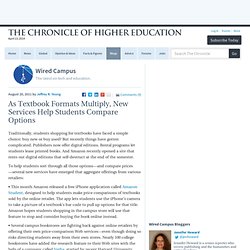
But recently things have gotten complicated. Publishers now offer digital editions. Rental programs let students lease printed books. Wired Campus. Wired Campus. The University of Kansas has had a faculty-approved open-access mandate in place since 2009.
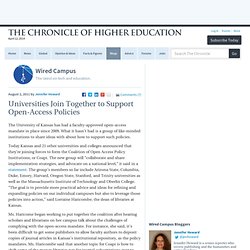
What it hasn’t had is a group of like-minded institutions to share ideas with about how to support such policies. Today Kansas and 21 other universities and colleges announced that they’re joining forces to form the Coalition of Open Access Policy Institutions, or Coapi. The new group will “collaborate and share implementation strategies, and advocate on a national level,” it said in a statement. The group’s members so far include Arizona State, Columbia, Duke, Emory, Harvard, Oregon State, Stanford, and Trinity universities as well as the Massachusetts Institute of Technology and Oberlin College. ProfHacker. How much would you be willing to pay on a monthly basis for all-you-can-read access to a scholarly database like JSTOR or Project MUSE?
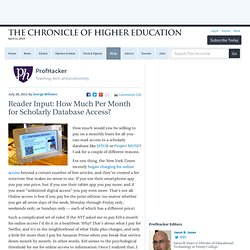
I ask for a couple of different reasons. For one thing, the New York Times recently began charging for online access beyond a certain number of free articles, and they’ve created a fee structure that makes no sense to me. If you use their smartphone app you pay one price, but if you use their tablet app you pay more, and if you want “unlimited digital access” you pay even more. That’s not all. Wired Campus. (This story was updated on July 21, 2011) Amazon has rolled out an e-textbook-rentals program, which could bring more attention to the emerging model of treating textbooks like online subscriptions.
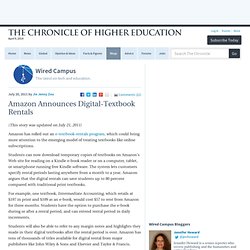
Students can now download temporary copies of textbooks on Amazon’s Web site for reading on a Kindle e-book reader or on a computer, tablet, or smartphone running free Kindle software. The system lets customers specify rental periods lasting anywhere from a month to a year. Amazon argues that the digital rentals can save students up to 80 percent compared with traditional print textbooks. For example, one textbook, Intermediate Accounting, which retails at $197 in print and $109 as an e-book, would cost $57 to rent from Amazon for three months. Community-College Students Perform Worse Online Than Face to Face - Community Colleges. By Ryan Brown Community-college students enrolled in online courses fail and drop out more often than those whose coursework is classroom-based, according to a new study released by the Community College Research Center at the Teachers College at Columbia University.
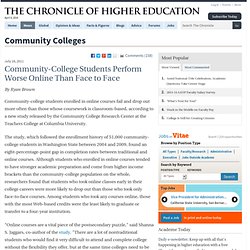
The study, which followed the enrollment history of 51,000 community-college students in Washington State between 2004 and 2009, found an eight-percentage-point gap in completion rates between traditional and online courses. How Will Colleges Innovate as the Market Is Disrupted? - The Editor's Notebook. The End of the Textbook as We Know It - Technology. By Jeffrey R.
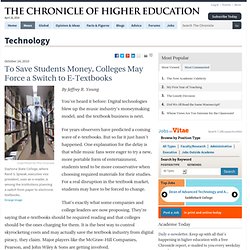
Young You've heard it before: Digital technologies blew up the music industry's moneymaking model, and the textbook business is next. For years observers have predicted a coming wave of e-textbooks. But so far it just hasn't happened. One explanation for the delay is that while music fans were eager to try a new, more portable form of entertainment, students tend to be more conservative when choosing required materials for their studies. That's exactly what some companies and college leaders are now proposing. Blind Florida State U. Students Sue Over E-Learning Systems - Wired Campus. Two blind students at Florida State University have sued the institution and its Board of Trustees for discrimination, arguing that a mathematics course at the university relied on e-learning systems that were not accessible to the disabled.
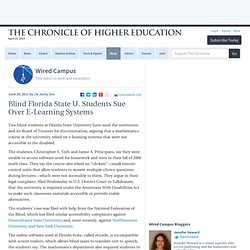
The students, Christopher S. Toth and Jamie A. Principato, say they were unable to access software used for homework and tests in their fall of 2009 math class. They say the course also relied on “clickers”—small remote-control units that allow students to answer multiple-choice questions during lectures—which were not accessible to them. They argue in their legal complaint, filed Wednesday in U.S. The students’ case was filed with help from the National Federation of the Blind, which has filed similar accessibility complaints against Pennsylvania State University and, most recently, against Northwestern University and New York University.
Daniel F. Publishers Grapple With Thorny Issues of Protecting Property and Going Digital - Publishing. By Jennifer Howard Baltimore Collaborate and share—but protect your copyrights. That was the sometimes conflicting message heard at the Association of American University Presses' annual meeting, which ended here on Sunday. The Rise of Teaching Machines - The Digital Campus. House Panel Votes to Repeal 'Credit Hour' and 'State Authorization' Rules - Government. By Armando Montaño Washington The U.S.
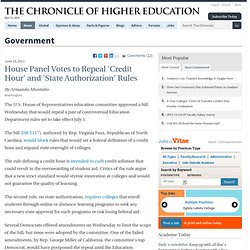
House of Representatives education committee approved a bill Wednesday that would repeal a pair of controversial Education Department rules set to take effect July 1. Education Department Clarifies E-Reader Accessibility Rules - Wired Campus. The U.S. Department of Education today released a new guide to laws and rules colleges must follow to ensure e-reading devices and other emerging technologies are accessible to all students.
It focuses on students with vision problems, a group whose access issues have triggered official complaints against colleges. The document, in the form of “Frequently Asked Questions,” was published in response to the department’s “Dear Colleague” letter to college presidents on the subject last June. Students Say Tablets Will Transform College, Though Most Don't Own Tablets - Wired Campus. More than two-thirds of a large group of college students say that tablet computers will change the way students learn, according to survey results released today. The Pearson Foundation sponsored the survey of 1,214 college students, as well as 200 high-school seniors who are heading to college, and found overwhelming interest in the devices.
Most of the students were not speaking from experience: Only 7 percent of the college students and 4 percent of the high school seniors owned one. Still, 69 percent of the college students said that tablets will transform higher education, and 48 percent said tablets will replace textbooks—at least as we currently understand textbooks—within the next five years. The survey was conducted for the foundation this March by Harris Interactive, which weighted the sample so it was representative of the American college population in terms of income, ethnicity, geography, and other factors. How to Join the Campaign for the Future of Higher Education (and Why You Want To) QuickWire: Top 10 Trends in Academic Libraries - Wired Campus.